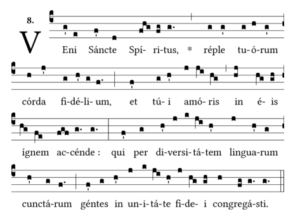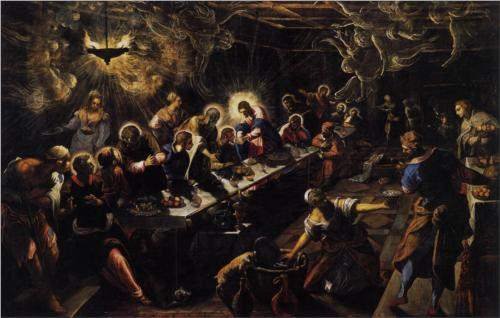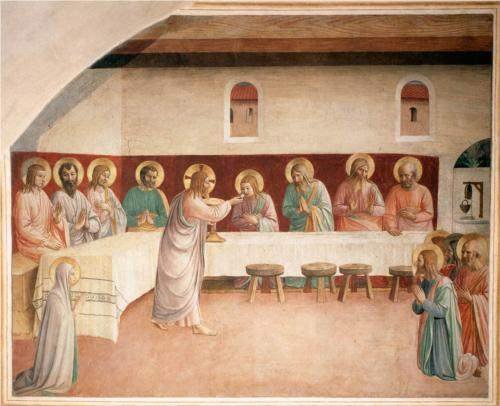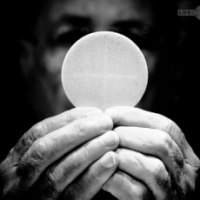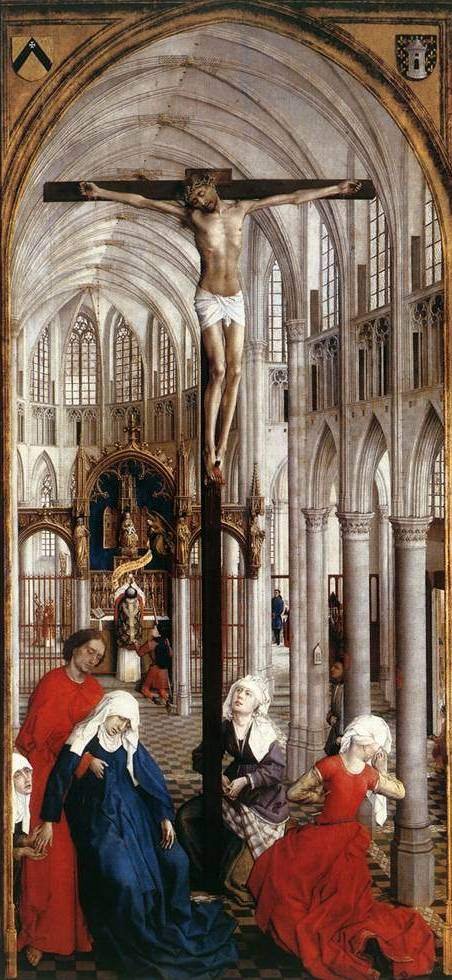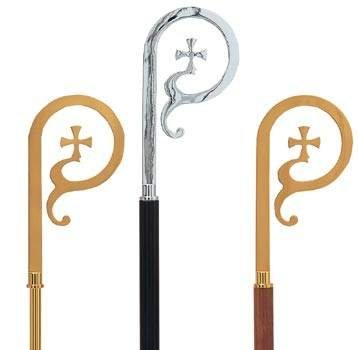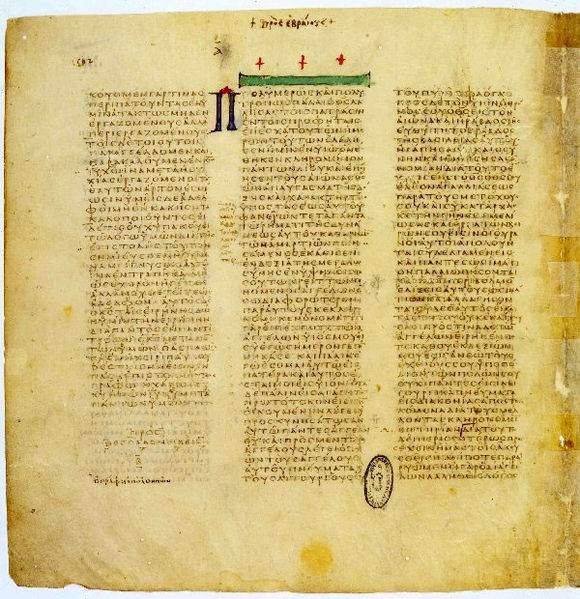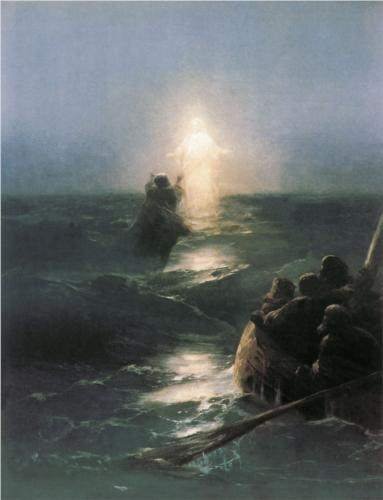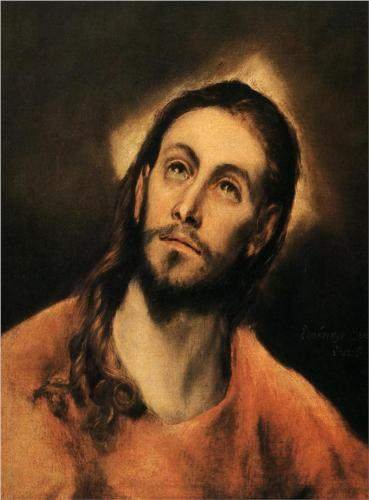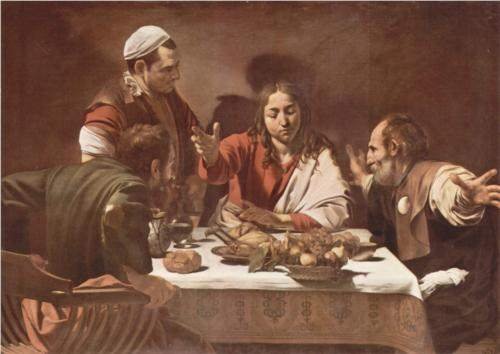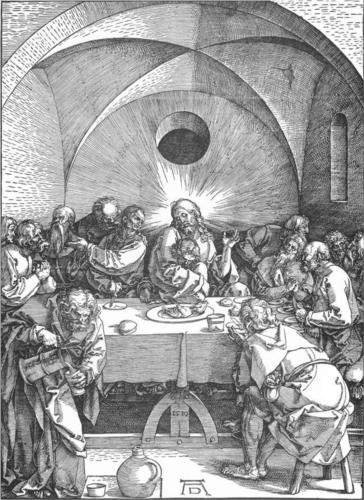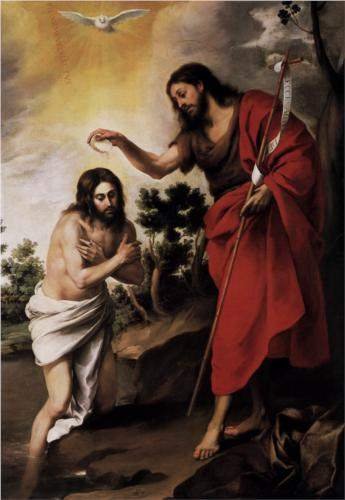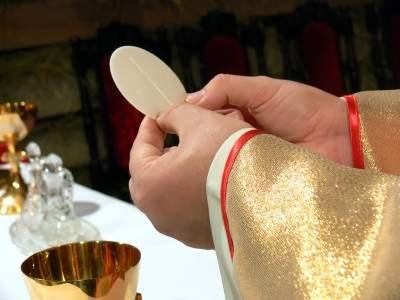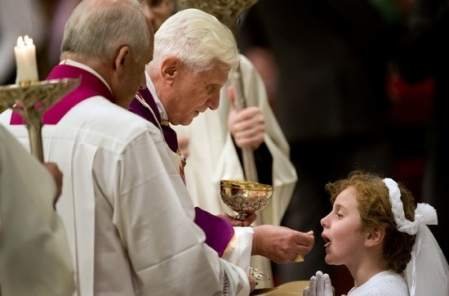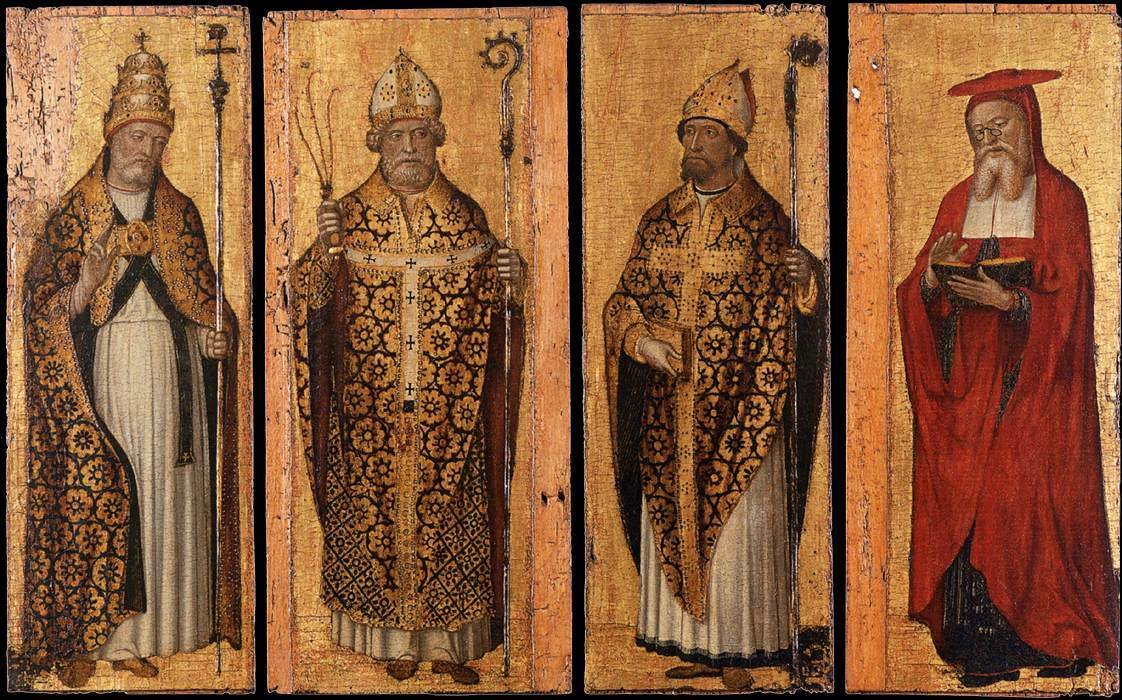Often when it comes to the Scripture readings at Mass — especially in early morning Masses — I must confess, my eyes sometimes tend to glaze over a little and I don’t absorb them as well as I should. This is why it’s important for me to have read them beforehand, something I often don’t do in my hurry. But yesterday, in my recent commitment to greater spiritual study, I decided to take the time to thoroughly study today’s Mass readings, knowing that I wouldn’t have time in the morning. And it made an incredible difference. When it came to the Liturgy of the Word, the words of Scripture rang glowingly into my ear, like dear, familiar friends. Even in my undercaffeinated state, my mind grasped them and made connections, especially when Father Joe illuminated them in the homily.
The past few Sundays the Mass readings have focused on John Chapter 6, which culminates in Jesus’s proclamation, “I am the Bread of Life.” This is one of the most crucial passages in all the Gospels, not only for the good news of salvation, but even more particularly for the Catholic understanding of the Eucharist. “Whoever feeds on my flesh and drinks my blood has eternal life, and I will raise him up on the last day. For my flesh is true food, and my blood is true drink.” (John 6:54-55). Catholics read this, together with the narratives of the institution of the Lord’s Supper (Matthew 26:26-29, Mark 14:22-25, Luke 22:14-23), as an explicit statement of Christ’s Real Presence in the Eucharist, and of the Eucharist itself as the source and summit of our faith, the Sacrament through which we intimately encounter Christ and receive his graces.
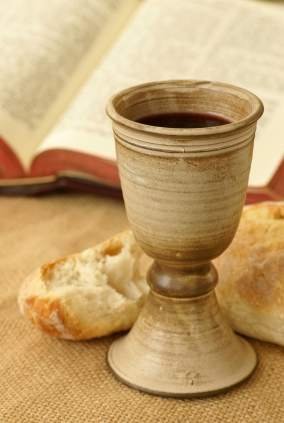
As a Protestant, of course, I didn’t read it that way. Much as I do at early morning Masses, my eyes glazed over and I saw only what I had always been taught. I could not see, despite Jesus’s best attempt to be frank and make Himself clear. Jesus saying that He is the Bread of Life is of course a metaphor. “Eating” and “drinking” Jesus just means, metaphorically, that we should consume and inbibe the Word of God. Of course He didn’t mean that we should really eat Him. The thought never even occurred to me; it would have startled me if it had — as it did the moment I first read it in the light of the Catholic explanation, at age thirty-something.
Once I saw that, there was no going back. I could never again read the passage and see anything but the obvious. I have a difficult time now even grasping at alternate, symbolic interpretations for the sake of argument. So I was taken aback to read the Protestant commentary on this passage in the study notes of my heretofore favorite Bible, the evangelical ESV Study Bible. This is by far the glibbest, most sectarian analysis I have yet found here. It exhibits either willful ignorance of the historical Christian (and Catholic) understanding, or wanton dishonesty.
I am hesitant to name names, but this is a matter of some import — the very underpinning of historic Christianity and of the Catholic faith. I am thankful that my ESV Study Bible at least gives ample credit to the contributors of each book’s study notes. The notes to the Gospel of John are by Dr. Andreas J. Köstenberger [1, 2], Senior Professor of New Testament and Biblical Theology at Southeastern Baptist Theological Seminary — someone who should know better. I do not here aim to slam Dr. Köstenberger — I cannot fault the man, or the editors of the ESV Study Bible, or the executives at Crossway, for stating an evangelical interpretation in an evangelical publication for an evangelical audience. But I am here calling him out for some flagrantly bad commentary, that doesn’t even consider — even to reject it — a prominent theological view held not only by the majority of the world’s Christians, but by the entirety of the Christian Church until the Protestant Reformation (as we have seen). It seems rather to reflect a desire to sweep the historical view under the rug, to pretend it doesn’t exist, has not been historically significant, and is not widely held to this day. This is not an uncommon evangelical tactic, but I expected higher of the ESV Study Bible and of Dr. Köstenberger.
The Bread of Life
This is a lengthy passage of Scripture — encompassing in its full context John 6:22-71, some fifty verses and 1,000 words. I encourage you to read the whole thing. The ESV translation of the text itself is solid, as I have found it to be elsewhere almost without exception. For the sake of brevity, I will summarize and paraphrase a bit.
This speech takes place very soon after the miracle of the loaves and fishes, when Jesus fed the multitude (earlier in the chapter in John’s Gospel, John 6:1-15). The Apostles got in the boat to cross to the other side of the Sea of Galilee, and Jesus walked on water to meet them (John 6:16-21). When the crowd — the Jesus groupies — realized where He’d gone, they flocked to Him and resumed asking Him questions (John 6:22-25). Jesus answered:
“Truly, truly, I say to you, you are seeking me, not because you saw signs, but because you ate your fill of the loaves. Do not work for the food that perishes, but for the food that endures to eternal life, which the Son of Man will give to you. For on him God the Father has set his seal.” (John 6:26-27)
The crowd still had food on the brain; their own stomachs, or what they could get out of Jesus materially or temporally: how Jesus could help them in their day-to-day lives and make them prosperous and healthy (not unlike many Christians today). Jesus urged them not to work for temporal, perishable food, but the food that He will give to them, the food of salvation. The crowd asked how they were supposed to work for this food (John 6:28). Jesus answered:
“This is the work of God, that you believe in him whom he has sent.” (John 6:29)
The crowd expected Jesus to perform a sign for them, as a prophet would, that they might believe in Him. Moses made manna, bread from heaven, fall to feed our fathers in the wilderness (John 6:30-31). Jesus answered:
“Truly, truly, I say to you, it was not Moses who gave you the bread from heaven, but my Father gives you the true bread from heaven. For the bread of God is he who comes down from heaven and gives life to the world.” (John 6:32-33)
Okay, yes, Jesus is building a metaphor here — a beautifully rhetorical one. Manna came down from heaven from God, and it gave nourishment to the Israelites. The Son of Man came down from heaven, and will give life to the whole world. And…
“I am the bread of life; whoever comes to me shall not hunger, and whoever believes in me shall never thirst.” (John 6:35)
In reading this passage and other similar passages, one should understand that in Greek, the person (i.e. first person, second person, third person) is contained in the verb. Writing only εἰμι contains the full sense of “I am.” So when the personal pronoun is added in addition (ἐγώ εἰμι, or egō eimi), it makes a strong, emphatic declaration. “Just to be clear, y’all: This bread from heaven I’m talking about? It’s me. I am the bread of life. Come to me and believe in me, and you’ll never hunger or thirst again.”
Verses 36 through 40 — containing the statements that God the Father gives Christ those who will be saved, and it is God’s will that Christ should lose none of them, and that all who believe in Christ should be saved and have eternal life — have a lot of bearing on soteriology, especially in discussion of divine election. I don’t gloss over them here to avoid that discussion, but because it’s not my point at the moment.
The Jews grumbled among themselves. “Who does this guy think he is, saying he is the bread of life and that he came down from heaven? We know his parents; he came from right down the road” (John 6:41-42).
And we come to the point of contention:
“Truly, truly, I say to you, whoever believes has eternal life. I am the bread of life. Your fathers ate the manna in the wilderness, and they died. This is the bread that comes down from heaven, so that one may eat of it and not die. I am the living bread that came down from heaven. If anyone eats of this bread, he will live forever. And the bread that I will give for the life of the world is my flesh.”
And Jesus’s beautiful metaphor hit the floor with a sickening splat. What!? All this talk about being the bread of life; “believe in me and you shall never be hungry again” — and then He brought it back to the stomach, with a stomach-turning suggestion. He had so far been drawing the metaphor between the Israelites eating manna in the desert for their daily, temporary sustenance, and Himself being the true bread, with which they would never hunger or thirst again; that the work of receiving this bread is only to believe in Him. And then Jesus blew the metaphor away. “If you eat this bread, you will live forever. And oh, this bread is my flesh. That’s right. I want you to eat my flesh” (John 6:47-51). And the Jews understood His words exactly like that: “How can this man give us his flesh to eat?” (John 6:52)
Here is where I will begin addressing Dr. Köstenberger's commentary. For the above verses, he writes:
living bread. The “bread” Jesus gives is his flesh (a reference to Jesus’ death on the cross). Jesus’ statement intermingles physical and spiritual truth. Jesus is not talking about literal “bread,” but he is the true “living bread” in the sense that those who believe in him have their spiritual hunger satisfied. He becomes this spiritually satisfying “bread” by sacrificing his own physical body in his death on the cross, and in that sense he can say that this spiritual bread is my flesh.
Now, that is actually helpful. I had not thought of His “flesh” here referring to the Crucifixion; to giving of His flesh for the whole world, by which we are able to consume it. It is an important and valid point. In this sense the metaphor continues. But Köstenberger’s note does not address the more immediate point: Jesus just disgusted His listeners with perhaps the most repugnant notion possible in the Jewish world, one so unthinkable that the Torah doesn’t even address it: cannibalism; the eating of human flesh. So, presuming Jesus was speaking metaphorically, He is now going to clarify the misunderstanding, right?
No; in fact, He just made it worse:
“Truly, truly, I say to you, unless you eat the flesh of the Son of Man and drink his blood, you have no life in you. Whoever feeds on my flesh and drinks my blood has eternal life, and I will raise him up on the last day. For my flesh is true food, and my blood is true drink.” (John 6:53-55)
“Not only do I want you to eat my flesh, but I want you to drink my blood.” The Jews have one of the most hemophobic cultures on this planet; there is little that is more disgusting and offensive to a Jew than being expected to touch blood, let alone consume it. And Jesus did not use the standard Greek verb “to eat” here when he emphasized this eating and drinking: φᾰγεῖν (phagein) is the standard, classical Greek verb “to eat,” the way humans eat a meal. The verb here instead is τρώγειν (trōgein), used especially of animals eating or feeding, most literally translated as “to bite, chew, gnaw.” The ESV translates this word above and in the following verses as “whoever feeds on my flesh.” Jesus, in explaining his proposition, was possibly being vulgar. “You must feed (as a horse feeds) — you must munch — on my body.” At the very least, His use of this word removed any doubt that He was referring to a physical eating, not a spiritual or metaphorical one. If Jesus was aiming to turn off his followers, He was doing a fine job.
Now, this verse — verse 55 — actually conceals what appears to be a significant question in textual criticism. I haven’t studied it in depth; I have a feeling a lot has been written on it, which I’d be interested to read. But where Jesus said that His flesh is “true food” and His blood is “true drink,” there are variant readings for the word translated “true.” The variation is minor, only a single letter; but it significantly shapes how the verse is understood. Is the word here ἀληθῶς (alēthōs), an adverb, or ἀληθής (alēthēs), an adjective? The words are of course related; but the variation means the difference between “My flesh is true food” — as modern textual critics and translators have concluded — or “My flesh is truly food” — as the texts available to the King James translators (i.e. William Tyndale) read.
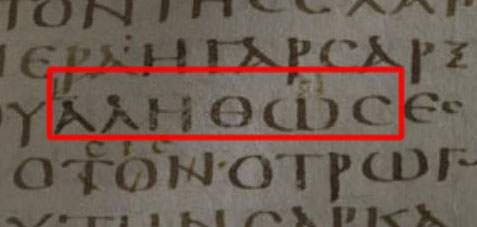
The disputed word in Codex Sinaiticus. The original text reads ΑΛΗΘѠϹ (αληθως), but note the correction: an eta (Η) written in superscript over the omega (Ѡ) — and then erased.
(Source: CodexSinaiticus.com)
(N.B. You can skip this paragraph unless you want the fine, nerdy details of the textual variant. I for one love a textual mystery!) And the disagreement is meaty. While generally the oldest and most reliable manuscripts — Codex Vaticanus (4th century) and Codex Ephraemi Rescriptus (5th century) being the best witnesses — give the adjectival reading, there is evidence of early confusion. Codex Sinaiticus (4th century) originally read with the adverb, but was corrected to the adjective — and then re-corrected back to the adverb. The only two papyri extant for the passage — Papyrus 66 (ca. A.D. 200, one of the oldest of all manuscripts) and Papyrus 75 (3rd century) — also show the disagreement. Papyrus 66 originally read with the adverb, but was corrected to agree with Papyrus 75, which contains the adjective. Among the oldest manuscripts, the adjectival reading appears to have won the debate. But in the longer term, the Majority (Byzantine) Text, which came to dominate and is represented by the majority of later extant manuscripts, and formed the so-called Textus Receptus used in the King James translation — received the adverbial reading. In sum: I tend to think, as an educated amateur, that the question is significant enough to at least warrant a footnote in modern translations of the alternate reading. I think there’s a possibility that the adverb — “truly” instead of “true” — was the original reading. But NA27, on which most recent Bible translations are based, selects the adjectival reading; and they know a lot more than I do.
Whether ἀληθής or ἀληθῶς — the adverb is derived from the adjective — the meaning is clear and explicit. Both the BDAG and the LSJ agree: the adjective means “true, real, genuine.” I personally think the adverb makes for a funner translation: “truly, really, actually, in reality” — because I would love to translate this word “for real.”
Jesus said, “My body is real food and my blood is real drink” — or “My body is really food and my blood is really drink.” In response to the Jews’ question, “How can this man give us his flesh to eat?” Jesus not only didn’t correct them, but restated his original statement even more explicitly. “If you want eternal life, you must actually eat my body and drink my blood.”
But of these verses, despite Jesus’s insistence and clarity, Dr. Köstenberger comments:
Unless you eat the flesh of the Son of Man and drink his blood cannot be intended literally, for no one ever did that.
What? Really? No one ever did what? Of course no one ever fed on Jesus’s flesh while attached to His frame, literally gnawed it from His bone; but Christians have been literally eating Jesus’s flesh and drinking His blood for 2,000 years. Or does Köstenberger mean, “No one ever intended (that reading)”? In either case, this statement, quite ridiculously, skirts over the many centuries of history when all Christians — every great Church Father and theologian — in fact did interpret this statement literally. In disputed passages of other books of the ESV Study Bible, the commentators give their evangelical interpretation, and then politely explain why they believe the Roman Catholic understanding is false. To comment on such a passage as this, and not even note that the majority of Christians in the world, Catholic and Orthodox, have a very different understanding of it, is misleading and a disservice to even evangelical readers, who should be aware of such an important disagreement.
Köstenberger continues:
As Jesus has done frequently in this Gospel, he is speaking in terms of physical items in this world to teach about spiritual realities. Here, to “eat” Jesus’ flesh has the spiritual meaning of trusting or believing in him, especially in his death for the sins of mankind. (See also v. 35, where Jesus speaks of coming to him as satisfying “hunger” and believing in him as satisfying “thirst.”) Similarly, to “drink his blood” means to trust in his atoning death, which is represented by the shedding of his blood.
Yes, this is the way Jesus teaches. But in this speech, He made clear that the act of “eating” and “drinking” encompasses both physical and spiritual realities. To “eat” Jesus’s flesh and “drink” His blood does indeed have the spiritual meaning of trusting and believing in Him. But if the spiritual meaning were the only one Jesus intended, why His emphasis, to the point of revulsion, on physically “eating” and “drinking”?
One of the keys to understanding Catholic theology — and one of the beauties, in its simplicity and complexity at the same time — is that just as this passage conveys both a physical and a spiritual sense, each of the Sacraments conveys both a physical and a spiritual effect. The Sacraments consist outwardly in simple, physical actions: washing with water, anointing with oil, the laying on of hands. And these actions not only symbolize a spiritual reality — the washing away of sins, the passing of authority and commissioning of duty — but they actually accomplish spiritually what they represent physically. It does what it says on the tin. Baptism not only symbolizes and outwardly represents the washing away of sins; but the physical washing with water, by the power of the Holy Spirit, actually accomplishes the spiritual washing away of sins. The consecration of Holy Orders by the laying on of hands not only symbolizes the passing of authority and binding to service; but it actually accomplishes the infusion of spiritual authority by apostolic succession.
And likewise the Eucharist, by the simple act of eating and drinking the consecrated Hosts, that have truly become the Body and Blood of Christ, not only symbolizes and represents Communion in Christ’s Body, but actually infuses us with His grace. We literally, physically, spiritually share in Christ’s Body and Blood, in His humanity and divinity, in His eternal life, as He here made plain in this Scripture.
Köstenberger again:
Although Jesus is not speaking specifically about the Lord’s Supper here, there is a parallel theme, because the receiving of eternal life through being united with “the Son of Man” is represented in the Lord’s Supper (where Jesus’ followers symbolically eat his flesh and drink his blood; cf. 1 Cor. 11:23–32). This is anticipated in OT feasts (see 1 Cor. 5:7) and consummated in the marriage supper of the Lamb (Rev. 19:9).
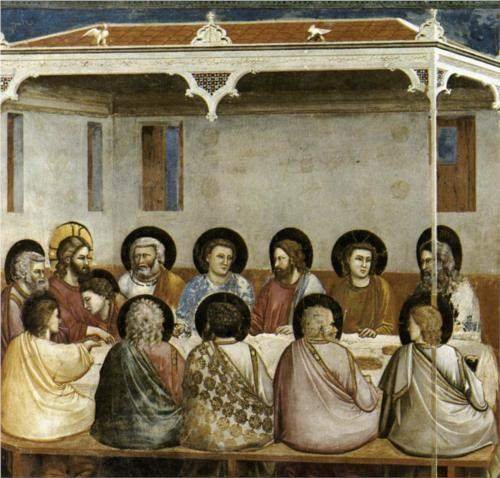
The Last Supper (1306), by Giotto. Scrovegni (Arena) Chapel, Padua. (WikiPaintings.org)
No way! You think? What an incredible coincidence, that Jesus would speak of eating his body and drinking his blood here, and then again at the Lord’s Supper! And both here and there, this eating and drinking is how one receives eternal life! Jesus said that one must eat his body and drink his blood to receive eternal life — and then at the Lord’s Supper, he offered the Bread as His body and the Cup as His Blood. Even when I was an evangelical, I understood the John 6 passage to be not only parallel to the Lord’s Supper, but an explicit reference, a foreshadowing.
After Jesus was done speaking, his disciples said to Him, “This is a hard saying; who can listen to it?” (John 6:60) “Jesus, that’s disgusting. Who wants to hear about eating your body and drinking your blood?”
But Köstenberger takes just the opposite interpretation:
It was a hard saying because they wrongly interpreted Jesus’ statements literally.
Yes, that’s the way they interpreted it; but if they wrongly interpreted His statements literally, Jesus had yet another opportunity here to correct them, when they directly challenged what He said. But instead He answered:
“Do you take offense at this? Then what if you were to see the Son of Man ascending to where he was before? It is the Spirit who gives life; the flesh is no help at all. The words that I have spoken to you are spirit and life. But there are some of you who do not believe.”
The words are not just spirit, they are also life. This reads as a continuing insistence that what He said before is what He meant. “But some of you still don’t get it.”
“After this many of his disciples turned back and no longer walked with him” (John 6:66). Because they are disgusted and disillusioned by what Jesus had just said. And still Jesus made no attempt to correct them, if there were some misunderstanding.
But Köstenberger seems to suggest that this statement is not even connected to His prior speech:
Many of these early disciples were not genuine disciples of Christ, for they turned back. Their initial “faith” was not genuine and they were perhaps following Jesus only because of the physical benefits he gave, such as healing and multiplying food.
This just happens to be where John notes their departure. But emphasizing that these departures are in fact connected to his previous words:
So Jesus said to the Twelve, “Do you want to go away as well?” Simon Peter answered him, “Lord, to whom shall we go? You have the words of eternal life, and we have believed, and have come to know, that you are the Holy One of God.” (John 6:66-69)
The context of this all is still Jesus’s “words of eternal life.”
Curiously, after all these explicit statements about eating Jesus’s body and drinking His blood, the Gospel of John contains no narrative of the institution of the Lord’s Supper. All three of the Synoptic Gospels have it; why doesn’t John?
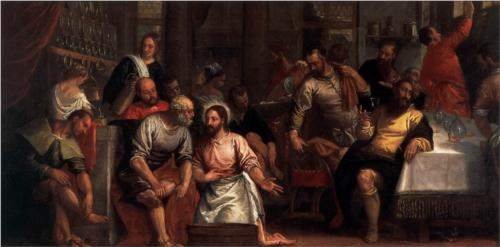
Christ Washing the Feet of the Disciples (1580s), by Paolo Veronese. (WikiPaintings.org)
I recently read a very compelling book review that deals with just this problem. In Eucharist and Covenant in John’s Last Supper Account, Msgr. Anthony La Femina proposes that Christ’s washing of the Apostles’ feet (John 13:1-20) — the central action of John’s narrative of the Last Supper, but something none of the Synoptics mention — is in fact an analogy for the institution of the Eucharist. According to La Femina, the footwashing narrative contains all of the elements of the institution of the Eucharist — the command to repeat the action, a foreshadowing of Jesus’s death, a reference to his betrayer Judas Iscariot, and covenantal language which La Femina says echoes the language of Near Eastern treaties. It seems a compelling thesis that I would like to read more about.
But as for Jesus’s speech in John 6:22-71, there seems little question about what Jesus meant: If He did not intend for His words to suggest an actual eating and drinking of His body and blood, He would not have emphasized this statement more explicitly when questioned about it, and He would have made some effort to clarify the misunderstanding when His disciples protested, if it was in fact a misunderstanding. Dr. Köstenberger’s notes in the ESV Study Bible seem not only to present a sectarian interpretation — which is expected — but to consciously ignore and dismiss the historical understanding of the passage. At best, they present unhelpful commentary, missing and dismissing obvious connections and leading away from a thorough understanding of the text rather than toward it.
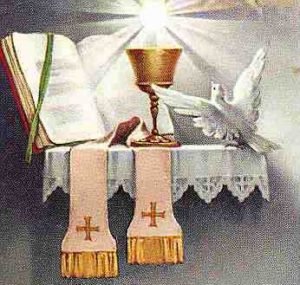 The essential ground of the Holy Spirit is the Sacraments. When I was first becoming Catholic, I was so accustomed to looking for the Holy Spirit in outward signs and wonders that I mistook that He was missing or absent from Catholic life altogether. Far from being absent, the Holy Spirit is the Spirit of God on the earth, and is present in the Church, in everything we do, and most of all in us. In each of the Sacraments, God works in our lives and communicates His grace to us through the Holy Spirit.
The essential ground of the Holy Spirit is the Sacraments. When I was first becoming Catholic, I was so accustomed to looking for the Holy Spirit in outward signs and wonders that I mistook that He was missing or absent from Catholic life altogether. Far from being absent, the Holy Spirit is the Spirit of God on the earth, and is present in the Church, in everything we do, and most of all in us. In each of the Sacraments, God works in our lives and communicates His grace to us through the Holy Spirit.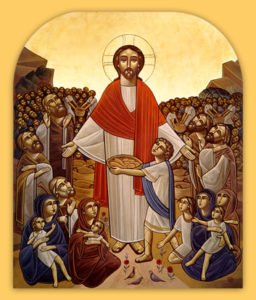 Jesus worked His miracles through physical touch, visiting His people in the flesh and impacting their lives by direct and physical interaction. He gave us the Eucharist using the same physical language of encounter: “I am the living bread which came down from heaven; if any one eats of this bread, he will live for ever; and the bread which I shall give for the life of the world is my flesh.” (John 6:51) As He invited sinners throughout his earthly ministry, He invites us to sup with Him and share a meal with Him (Revelation 3:20). After He ascended bodily to Heaven, and sent His Holy Spirit to be our Paraclete, He nonetheless left us with the possibility, in that meal and through the Spirit, of such an intimate encounter with Him. As He touched us physically during His earthly ministry, through His Body and Blood in the Eucharist, he continues to touch us physically in the most intimate communion, and through that touch to work powerfully in our hearts and spirits. The Sacraments are the means by which the Holy Spirit enters, is poured into our lives. He literally fills us and transforms us.
Jesus worked His miracles through physical touch, visiting His people in the flesh and impacting their lives by direct and physical interaction. He gave us the Eucharist using the same physical language of encounter: “I am the living bread which came down from heaven; if any one eats of this bread, he will live for ever; and the bread which I shall give for the life of the world is my flesh.” (John 6:51) As He invited sinners throughout his earthly ministry, He invites us to sup with Him and share a meal with Him (Revelation 3:20). After He ascended bodily to Heaven, and sent His Holy Spirit to be our Paraclete, He nonetheless left us with the possibility, in that meal and through the Spirit, of such an intimate encounter with Him. As He touched us physically during His earthly ministry, through His Body and Blood in the Eucharist, he continues to touch us physically in the most intimate communion, and through that touch to work powerfully in our hearts and spirits. The Sacraments are the means by which the Holy Spirit enters, is poured into our lives. He literally fills us and transforms us.


